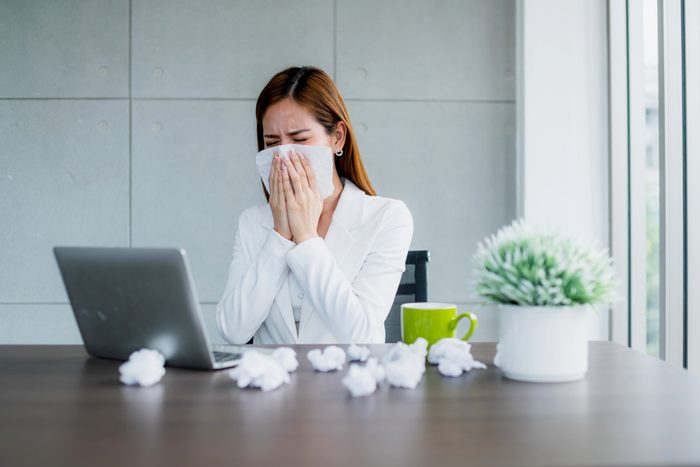
Can you get through allergy season—naturally?
Seasonal allergies are annoying, and so are the drugs you pop to relieve sneezing, sniffling, and itchy, red eyes. (They tire you out! They’re expensive!) While you can’t reduce the pollen in the air, you might be able to limit the number of drugs you take in response and through some natural remedies for allergies. In fact, there is a myriad of time-honored natural solutions that may do the trick just as well as some of the medicinal treatments available, according to Lakiea Wright, MD, Medical Director of U.S. Clinical Affairs at Thermo Fisher Scientific and a board-certified physician in internal medicine and allergy and immunology. Here are some natural remedies for keeping your allergy symptoms at bay.
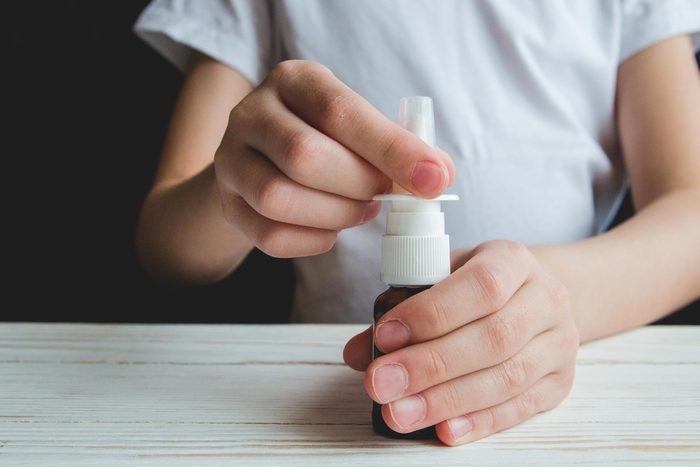
Rinse with saline before symptoms strike
Head off allergies by starting to treat them before you feel anything, advises Nathanael Horne, MD, of New York Medical College. This is especially important these days, as allergy season seems to start earlier every year. One of the easiest natural remedies for allergies is to spritz a saline rinse into your nose daily to wash away pollen. This method won’t necessarily take the place of medication, but it could reduce your need for drugs. In one study, participants who rinsed their sinuses daily for eight weeks reported less nasal congestion than those who didn’t. Allergists with allergies swear by saline rinses as well as these other tricks to controlling allergy symptoms.

Choose fish over chicken or beef
One study published in the journal Pediatric Allergy Immunology found that eating fish once a month more at the age of 12 months reduced the risk of allergic rhinitis, or hay fever, by the age of 12 years. This may be in part by the fact that fish contains omega 3-fatty acids, which possess anti-inflammatory effects, notes Elizabeth Trattner, a board-certified doctor of oriental medicine and acupuncture in Miami. She recommends choosing salmon and mercury-free tuna, as well as these foods high in omega-3 fatty acids.

Never leave without a wide-brimmed hat and sunglasses
It may look like you’re an incognito Hollywood star, but both of these natural remedies for allergies will help keep pollen from blowing into your eyes and making them an itchy, watery mess. Check out these weird things that make your allergies worse.
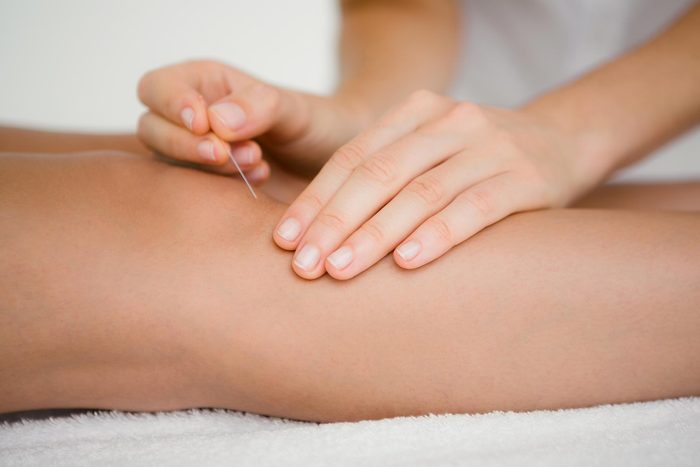
Try acupuncture
Acupuncture may help relieve hay fever, according to research published in the Allergo Journal International. Although experts don’t know for sure why acupuncture acts as natural allergy relief, Dr. Wright notes that one must continue the therapy consistently to experience any real tangible benefit. There are many other surprising conditions that you can treat with acupuncture.
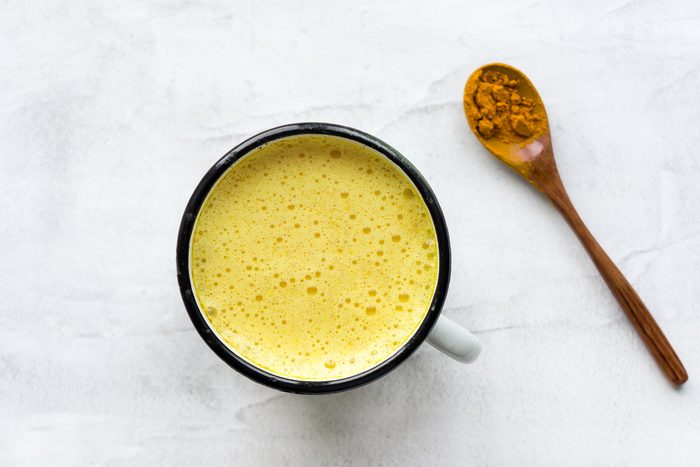
Cook with turmeric
Turmeric, a spice common in curry and Indian cuisine, contains curcumin, the ingredient that gives it that bright yellow hue. Bharat Aggarwal, PhD, professor of experimental therapeutics at MD Anderson Cancer Center in Houston, notes that it appears to be as effective as some drugs for certain conditions, allergies being one of them. Turmeric may act as a decongestant, help reduce allergy symptoms, and ward off colds. Try adding these other healing herbs and spices to your recipes for good health.

Move your outdoor workout to dusk
Save outdoor exercise for the evening, advises H. James Wedner, MD, of the Washington University School of Medicine in St. Louis. Not only do many people with allergies experience more sneezing and itching in the morning, but many trees release their pollen at first light, and ragweed pollen tends to fly most thickly at midday—so stick to end-of-day strolls. (Allergists reveal the worst advice they’ve ever heard about allergies.)

Change your clothes when you come home
You already know to leave windows shut and to avoid spending time outdoors on windy, sunny, pollen-infested days, but don’t forget that you drag pollen into your home on your clothes and shoes even if you can’t see it. To help keep the spread of pollen to a minimum, toss soiled clothes in the hamper immediately—even better, jump in the shower.
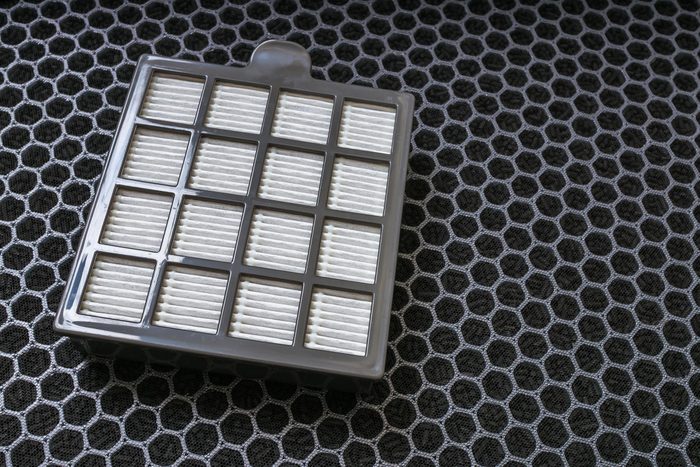
Make sure your appliances have HEPA filters
If you don’t have a high-efficiency particulate air (HEPA) filter in your vacuum cleaner, you may be making your symptoms worse by stirring up pollen that has settled on your floor and furniture, says Selina Gierer, a doctor of osteopathic medicine and allergy expert at the University of Kansas Medical Center in Kansas City. Using HEPA filters in your air conditioner or heating system can also help ease allergy symptoms. Some experts suggest placing a freestanding air purifier with a HEPA filter in a high-traffic area. (These HEPA filter vacuums are great for people with allergies.)

Change your car’s cabin air filter
It’s a good idea to do this yearly, says Dr. Wedner, as older cabin air filters can blast pollen pretty much directly into your face. In addition, learn if a car air purifier can help improve air quality.

Take meds at night, not in the morning
Hay fever symptoms, such as runny nose, scratchy throat, and sneezing typically, are at their worst in the morning. What helps for most people is taking medication at bedtime, says Richard Martin, MD, a pulmonologist at National Jewish Health in Denver. Don’t forget to ask these super-important questions next time you’re prescribed a new medication!
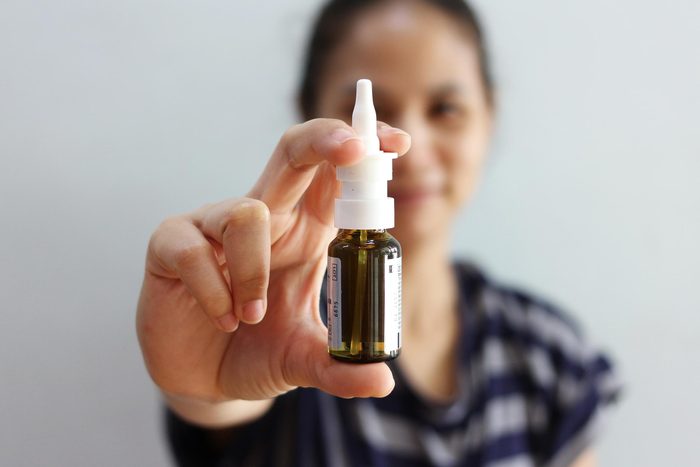
Know when to break out the drugs
Still a sodden, itchy mess? It’s time to try conventional medicine. If you only experience symptoms occasionally, you’ll most likely need an over-the-counter antihistamine, a nasal decongestant spray, or both. If you suffer throughout the season, you may need to substitute or add a prescription steroid spray. Here are some allergy nasal spray brands that allergists recommend.
